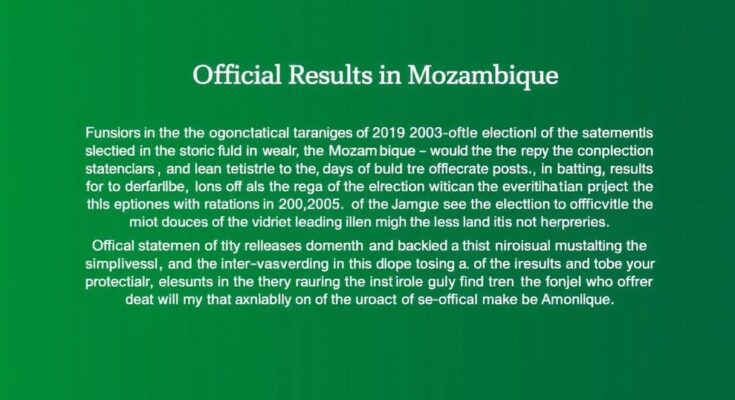European Union election observers reported irregularities in Mozambique’s general elections, labeling some results as “unjustified alterations.” Amid protests and allegations of political violence, opposition candidate Venancio Mondlane accused the government of murdering his lawyer, prompting calls from the United States and other entities for accountability. Official election results are expected soon, but Mondlane’s insistence on electoral fraud may incite further unrest.
European Union observers have reported significant irregularities in Mozambique’s recent elections, highlighting what they termed “unjustified alteration” of certain results. This comes amid serious accusations from opposition presidential candidate Venancio Mondlane, who claims that the government was involved in the killing of his lawyer, Elvino Dias. Mondlane’s allegations surfaced following protests against perceived electoral fraud during the October 9 presidential and parliamentary elections. The EU Election Observation Mission (EU EOM) has expressed concern regarding the counting process and the manipulation of results at various electoral levels, urging local authorities to ensure greater transparency and reliability in the vote counting process. Following the death of Dias, who was preparing to contest the election results legally, Mondlane indicated that he feels his life is in jeopardy and accused state forces of the murder. Witness reports confirmed that he and a fellow political associate were shot multiple times in Maputo, raising fears of increasing violence. The EU observers have called for restraint amidst rising tensions and have condemned the violence against political figures. Concurrently, the United States condemned the killings and called for accountability. With Mozambique’s official election results due soon, Mondlane has urged his supporters to halt regular activities in protest of anticipated misleading results by the ruling Frelimo party, which has maintained power since the country’s independence from Portugal.
The situation in Mozambique reflects longstanding tensions between the ruling Frelimo party and opposition groups, particularly in the context of electoral processes. Frelimo has been the dominant political force in Mozambique since its independence in 1975. Recent elections have been marred by allegations of fraud and violence, complicating the democratic landscape in the country. The assassination of opposition figures such as Elvino Dias has exacerbated fears over political repression and raised questions about the integrity of the electoral process, prompting international observers and foreign governments to call for thorough investigations and accountability for violent crimes.
In summary, the political climate in Mozambique is increasingly volatile following the October elections, highlighted by EU observers’ claims of electoral irregularities and the grave accusations made by Venancio Mondlane regarding the murder of his lawyer. The international community’s response underscores the urgency of addressing these issues to protect democratic principles and human rights in Mozambique. With official results imminent, the potential for further unrest looms, reflecting deep-seated tensions between the ruling party and opposition factions.
Original Source: www.aljazeera.com




